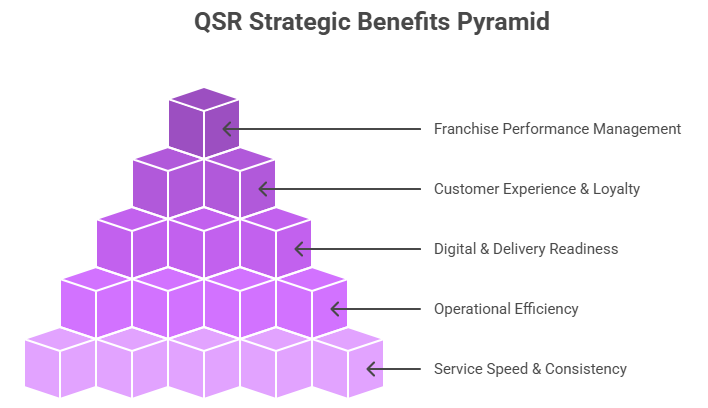In the Quick Service Restaurant (QSR) industry, where every second counts, operational speed and service consistency define competitiveness. Customers today expect faster fulfillment, seamless digital ordering, and superior in-store experiences, regardless of brand or geography. With rising consumer expectations and intensifying competition from both global franchises and delivery-first cloud kitchens, QSR players must continually assess their performance to stay ahead.
Strategic benchmarking has emerged as a key enabler for QSR excellence. It allows businesses to compare their operational metrics, service standards, and digital capabilities against leading industry performers, revealing tangible pathways for improvement. From drive-thru efficiency and kitchen throughput to delivery accuracy and customer engagement, benchmarking provides actionable insights that directly impact profitability and brand loyalty.
Nexdigm’s QSR Strategy Benchmarking Studies help foodservice operators transform operational data into strategic direction. By integrating performance analytics, process intelligence, and customer experience metrics, Nexdigm enables QSR brands to improve speed, enhance service quality, and build sustainable differentiation in a crowded, fast-moving market.
Nexdigm’s QSR Strategy Benchmarking Framework
Nexdigm’s QSR Strategy Benchmarking Framework is designed to help foodservice brands uncover operational inefficiencies, measure service quality, and translate insights into faster, smarter, and more consistent execution. The framework combines quantitative outlet-level benchmarking with qualitative process and technology assessments, ensuring every aspect of the QSR value chain is optimized for excellence.
- Outlet and Operational Benchmarking: We begin by assessing outlet-level metrics such as average order processing time, drive-thru service duration, order accuracy, and customer wait time. This enables brands to understand performance variability across locations, identify high-performing units, and replicate their operational best practices system-wide.
- Workflow and Process Efficiency Mapping: Nexdigm maps end-to-end operational workflows. This helps identify process redundancies and opportunities for faster throughput, improved resource utilization, and smoother coordination between front and back of house.
- Technology and Digital Enablement Benchmarking: In today’s digital-first QSR landscape, technology directly impacts service speed and customer satisfaction. Our benchmarking framework evaluates POS integration, order automation, mobile app usability, digital payment systems, and AI-enabled demand forecasting, helping brands strengthen their tech-driven agility.
- Customer Experience and Brand Consistency: Beyond operational metrics, Nexdigm benchmarks customer satisfaction, loyalty scores, and feedback systems to assess how consistently the brand delivers across touchpoints. This ensures that service excellence is both scalable and repeatable, regardless of location or format.
- Actionable Strategic Roadmap: The insights derived from benchmarking are transformed into a customized performance roadmap, outlining specific operational improvements, training priorities, and digital transformation milestones. This roadmap enables leadership teams to focus on sustained performance optimization and customer-centric innovation across all outlets.
Strategic Benefits for QSR Stakeholders
In an industry where operational precision and customer experience directly influence profitability, strategic benchmarking gives QSR stakeholders a competitive edge through data-backed decision-making and continuous improvement. Nexdigm’s approach empowers QSR operators, franchise owners, and corporate leadership to convert benchmarking insights into measurable business outcomes.

- Enhanced Service Speed and Consistency: By comparing outlet-level performance across regions, brands can identify bottlenecks in order processing and fulfillment and standardize best practices that improve speed without compromising quality. This leads to faster service cycles and higher customer satisfaction.
- Improved Operational Efficiency: Benchmarking workflow, staffing, and inventory utilization uncovers hidden inefficiencies and highlights opportunities for optimization. As a result, QSRs can reduce wastage, lower operational costs, and achieve smoother day-to-day execution.
- Strengthened Digital and Delivery Readiness: Digital orders now account for a significant share of QSR revenue. Benchmarking digital adoption, delivery accuracy, and POS integration enables brands to enhance online customer experience and reduce order turnaround times, reinforcing omnichannel competitiveness.
- Elevated Customer Experience and Loyalty: By analyzing metrics like repeat order rate, customer satisfaction, and service accuracy, QSRs can pinpoint key drivers of loyalty. This helps build a consistent brand experience across dine-in, drive-thru, and delivery channels, boosting repeat visits and brand trust.
- Data-Driven Franchise Performance Management: Benchmarking franchise units on key KPIs ensures standardization, transparency, and accountability across the network. It supports better decision-making around franchise expansion, training programs, and performance-linked incentives.
Nexdigm’s QSR Strategy Benchmarking Study empowers brands to transform service operations into a source of lasting competitive advantage. By integrating operational analytics, technology benchmarking, and customer experience insights, we help QSR leaders identify performance gaps, replicate best practices, and enhance both speed and quality across every outlet.
To take the next step, simply visit our Request a Consultation page and share your requirements with us.
Harsh Mittal
+91-8422857704

